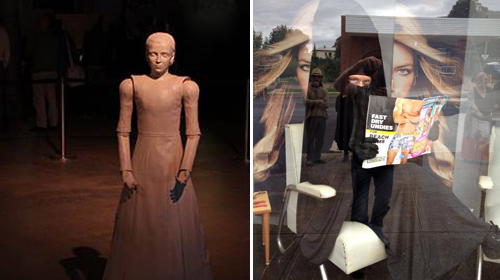Latest News Archive
Please select Category, Year, and then Month to display items
21 August 2019
|
Story Thabo Kessah
|
Photo Thabo Kessah
 Keafon Jumbam is gearing herself for the institutional Three Minute Thesis competition.
Keafon Jumbam is gearing herself for the institutional Three Minute Thesis competition.
Keafon Jumbam is a PhD candidate whose research on food and foxes has won her the first prize of R8 000 in the recent Faculty of Natural and Agricultural Sciences’ Postgraduate Flash Fact Competition. Her brief in the competition was to
summarise her research in three minutes, using only one static slide.“The competition started at departmental level on both campuses. The idea was that the best student in each department is then selected to go for the faculty-level competition on the Bloemfontein Campus. Summarising the entire research into three minutes is no easy feat, but a great way to gauge how well one has mastered your work,” she said.
Far-reaching research
“Thought-provoking presentations on research, ranging from technology to track academic progress, traditional medicine as alternatives to expensive prescriptions, and suggesting insects as food alternatives to curb hunger in this era of severe droughts and food shortages. The competition was tough, but it highlighted the level of research competitiveness on the Qwaqwa Campus. I hope that more students will join in such opportunities to build themselves up and to showcase our research output as Qwaqwa students,” added Jumbam from the
Department of Zoology and Entomology.
Institutional finals
Her next challenge is the institutional competition to be held on 23 August 2019, which could qualify her for the national competition.
Art2 + x [science] = 2 continents fused
2014-04-02
|

Left: Diamandini by Dr Mari Velonaki. Right: 'Muslim Hairdrying' by Cigdem Aydemir.
|
Mzanzi resistance art is set to fuse with Australian interdisciplinary art in an experimental ‘boiling pot’ – right here on our Bloemfontein Campus.
Program for Innovation in Artform Development (PIAD)
Kovsies and the Vryfees forged a highly-innovative link between South African and Australian artists by establishing the Program for Innovation in Artform Development (PIAD). Together we are embarking on a three-year collaboration to see what happens when experimental and community arts are fused.
The project includes intercultural laboratories, art and science exchange programmes, public forums as well developing and presenting experimental art.
Art(ist)s meet science(tists)
For the first time, two Australian artists will visit our Faculty of Natural and Agricultural Sciences in an exchange programme. The one is Dr Mari Velonaki, director of the Creative Robotics Lab at the University of New South Wales. The other is Dr Nigel Helyer, an honorary research fellow at the SymbioticA biotechnology lab at the University of Western Australia.
Dr Velonaki will explore new links between humans and computers that are community orientated. She will work closely with Prof PJ Blignaut and the Department of Computer Science and Informatics. In turn, Dr Helyer will investigate genetic coding and intercultural musical compositions. He will collaborate with Prof J Albertyn at the Department of Microbial, Biochemical and Food Biotechnology.
Vryfees 2014 and 2015 will also see contemporary and highly-experimental works from renowned Australian artists Cigdem Aydemir and Jess Olivieri. In addition, the festival will present OPENLab – a new national laboratory for early and midcareer artists and creative practitioners interested in making art in the public realm.
The programme is the result of a close partnership between the Vryfees and Situate Art in Festivals, managed by Salamanca Arts Centre in Australia (www.situate.org.au).
It also enjoys the support of:
- Australia Council for the Arts;
- NSW Artists Grant Scheme administrated by the National Association of the Visual Arts LTD;
- Situate Art in Festivals;
- National Lottery Distribution Trust Fund and
- Modern Art Project SA.
For more information on Piad visit www.vryfees.co.za or https://www.facebook.com/pages/PikoPiad/1435158293383474.